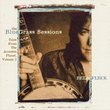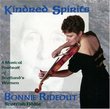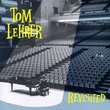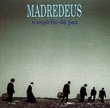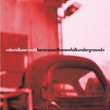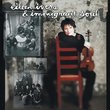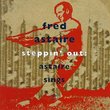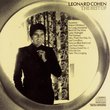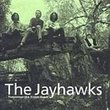| All Artists: Peggy Seeger Title: Three Score and Ten Members Wishing: 1 Total Copies: 0 Label: Appleseed Records Original Release Date: 1/1/2006 Re-Release Date: 3/27/2007 Genres: Folk, Pop Styles: Traditional Folk, Singer-Songwriters Number of Discs: 1 SwapaCD Credits: 1 UPC: 611587110022 |
Search - Peggy Seeger :: Three Score and Ten
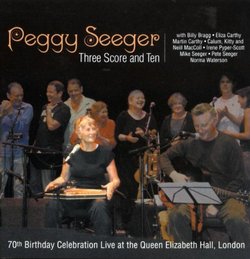 | Peggy Seeger Three Score and Ten Genres: Folk, Pop
Some of the greatest figures in US and UK traditional and sociopolitical music joined one of their own - Peggy Seeger - onstage at London's Queen Elizabeth Hall on May 29, 2005, in a concert celebrating Peggy's 70th bir... more » |
Larger Image |
CD DetailsSynopsis
Album Description Some of the greatest figures in US and UK traditional and sociopolitical music joined one of their own - Peggy Seeger - onstage at London's Queen Elizabeth Hall on May 29, 2005, in a concert celebrating Peggy's 70th birthday and her half-century professional career. A member of America's legendary musical Seeger family who married one of Great Britain's leading folksingers and activists, Ewan MacColl, singer/songwriter/folklorist/teacher Peggy is a crucial link between both countries' traditional and topical music and its practitioners. "Three Score and Ten" is a joyous and historic 2-CD document of Peggy's birthday concert. The recordings feature Peggy (vocals, guitar, banjo, concertina, piano, autoharp) on traditional and original favorites (including her feminist anthem "Gonna Be an Engineer"), new songs (the post-911 political reflections "Cavemen" and "Home Sweet Home"), and three spoken poems. She also performs the classic "First Time Ever I Saw Your Face," the song her future husband MacColl would write about their first meeting (and later a Grammy-winner and #1 US chart single for Roberta Flack in 1972.) In this family event, Peggy shares the stage with her half-brother Pete Seeger, the international folk/activist icon, and brother Mike (solo artist, old-time music expert and New Lost City Ramblers member) in one of their rare appearances together and the first-ever recording of all three together. Pete is also featured on three solo numbers, including "Where Have All the Flowers Gone." The contingent of British guests, aside from Peggy's three children - Calum, Neill and Kitty MacColl - and her partner Irene Pyper-Scott, includes the legendary folksinger and multi-instrumentalist Martin Carthy, his wife and performance partner Norma Waterson (a member of the traditionally oriented Watersons), and their daughter, singer/fiddler/solo artist Eliza Carthy. Contemporary singer/songwriter/activist Billy Bragg, a spiritual descendant of the Seeger/MacColl agit-folk tradition, duets with Peggy on "Darling Annie" and fronts the ensemble on "If You Want a Better Life." "Three Score and Ten" is an indelible, frequently rollicking and often moving testament to the living legacy of a great creative artist and that of her fellow musicians, family, friends and the traditions they celebrate and extend. Similarly Requested CDs
|
Member CD ReviewsReviewed on 5/5/2010... It's a good collection of Peggy Seeger songs, some of which are great. However, I found too many of the tracks to have an unfinished sound (because it's live, I suppose), and though there were some good accompanying artists their talents weren't used to the best ability. I was just looking for some more of Peggy's songs, though, and that I found, so I'm happy.
|

 Track Listings (12) - Disc #1
Track Listings (12) - Disc #1